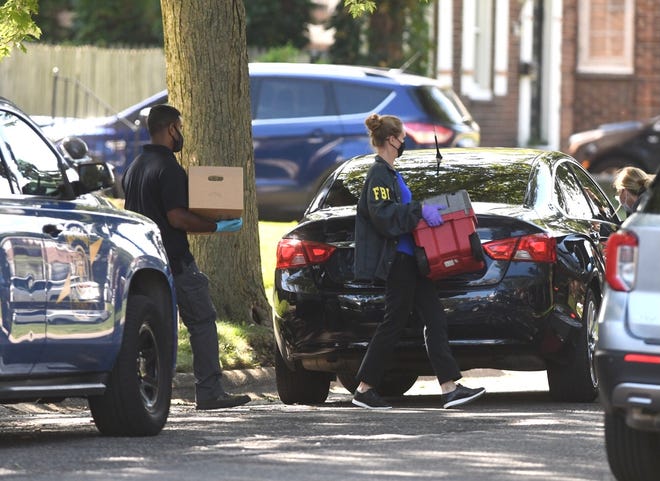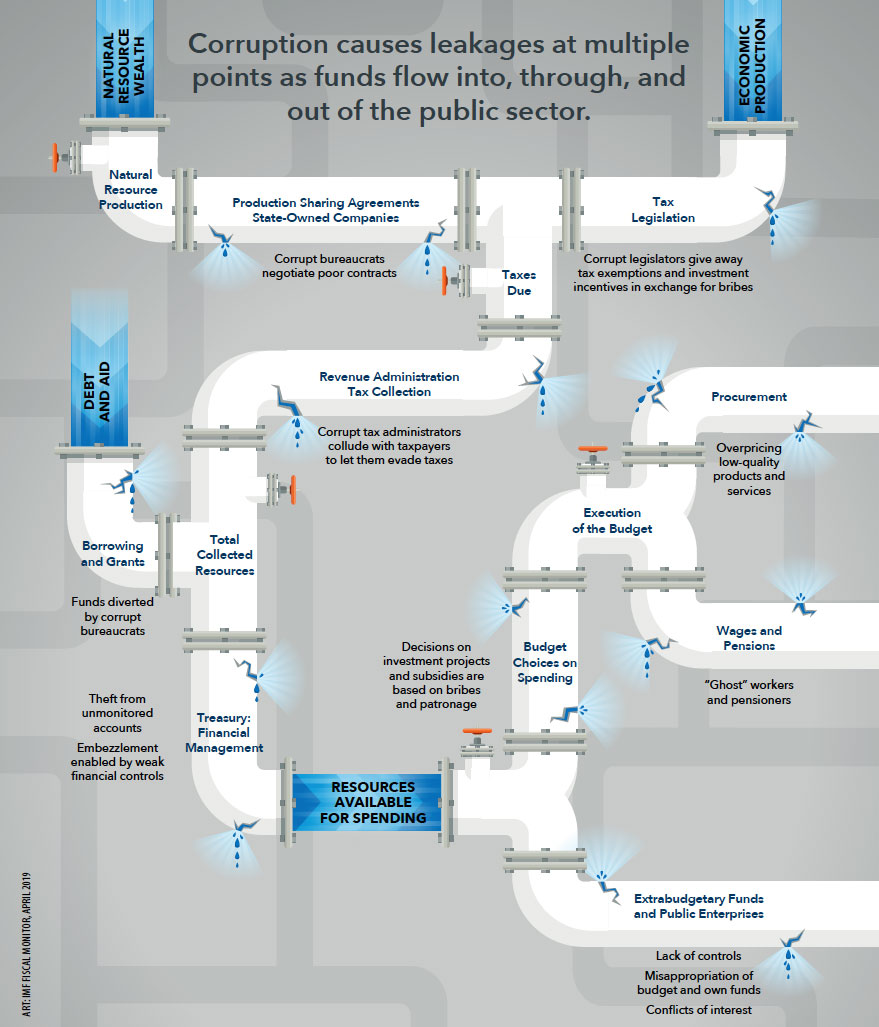Corruption is a drag on economic activity and generally makes regions/countries that have higher levels of it weaker and poorer. Corruption has been a problem in the making and the way we relate to each other, integrate our lives (and lifestyles) and develop a shared sense of national vision (i.e. its that darn Universal thing that keeps popping up!).
This has been going on for a long time and officials throughout the system didn't have a moral problem with being on the "take". Any source of money and/or other resource was stolen from those who needed it (i.e. schools, children, city services and residents) and put in the pockets of officials and businessmen/women (...not necessarily all local).
Its easy to point fingers isn't it? That system exists within a larger system of people who have been encouraging and profiting from such behaviors for a long time (There were a lot of blind eyes going on.). It also exists because of long-time divisions among the American people (I think some of us are still struggling with the why we are foot dragging rejuvenating our American brand through shared focus on national goals that transcends racial and religious boundaries. Many of these communities I have met and lived with and they want to be valued and part of the solution. That is why we should keep pushing closer to our ideals. 🤔)
Over time more and more people learned that working within that system under "who you know versus what you know" rules was how to get things done. The official and unofficial are still problems and there is likely much more to it than that but it goes back decades into the union-management relationships (hmmmm seem so similar. Maybe I need new eye glasses. 😲🙊). More effort is needed in teaching business students ethics to create a general sense of appropriate rules beyond the law. The law is limited by its applicability. (See Teaching Business Ethics and See Beyond Simple Belief and See Moral Courage and Ethics and "Ethics")
Things in Detroit didn't get done unless you were known through social and political circles as a trusted member. That meant people had to know you on a personal level to do business of any significance . The bidding process didn't mean much as a legal formality to circumnavigate the general rules to favor friends and associates. While we might think that corruption put the city into bankruptcy it was actually segregation and its long subconscious legacy of withdrawal (Its an observation and not a fact. The "facts" are more complex and likely to be a more academic discussion than anything else because we haven't moved beyond current racism dynamics so we can discuss it in a more emotionally removed manner. Its no longer Us vs Them but "We" versus ourselves. Our perspectives, social networks, economic activities, clubs, etc.. are intertwined where we all have some responsibility over defining and building our future together. We-conomics is a third book in the series that is based on transactions and shared future perspective that create organic oriented economic structure development. Maybe it is our collective conscious that is tapped to overcome shared environmental challenges? I think of collective conscious a little like how ants build bridges based on an internal ant algorithm even though they weren't trained to do it. Maybe they were trained...I'm just making a point. 😐 )
Connections ranged from Detroit to Chicago to Vegas to all over the place. One could almost trace them back to their origins if they had a framework for seeing and processing the data (There are a lot of cities that have this problem but the bankruptcy in Detroit highlighted its uniqueness because it represented a turning point in our perception of decline, corruption and what that might mean for the rest of the country. We are being chased by China so we might need to move into higher performing economic platform.). What you will find is that acceptance of key officials allowed the behaviors to become psuedo legitimate tipping aspects of the local economy (remember its Detroit and surrounding) into the shadow market. It had no choice but to go bankrupt as one factor sought to increase costs and the amount that could be pocketed while the population continued to declined because of gutted services leaving no money left in the bank. In other words, they took Detroit down to its knees through a resource draining system that left it starved for new capital (What must come through new business, residents, housing, and quality of life. See Perpetual Sustainable Development)
According to Erik Gordon, a professor at UoM Ross School of business tates, "
Clearly, there is a culture of corruption that doesn’t stop at the city line or the county line," (
Snell, Rahal, & Hunter, 2021, para 8).
These activities are typically occur through social connections so they are often hard to discover and find until you have someone on the inside. With city administration there are lots of different records and typically once outside law enforcement is aware and are motivated to take a look they begin to discover the processes used. Bankruptcy create a greater urgency to understand (See
Pension Fund and Leadership).
What we often find is that as corrupt networks become solidified they create mechanisms to control and enforcement their environment. There are different levels of sophistication but in the end some basic mechanisms exist. For example, in one subsystem (i.e. business) you would see a hiring/hiring arm (for politically connected officials), a firing arm (for those who don't follow the rules), an enforcement arm (keep people in line), mechanisms of taking in and washing money (perhaps multiple vendors purchasing from each other and then spending it for fun to clean it. 😬) (The shadow market runs just behind the official market but diverts resources toward key individuals and often underground institutions.)
Many of these systems follow our traditional systems and are shadows of how we might do things in the "legitimate" arena. The black market has their own stakeholders and followers and over time certain activities and mechanism form even if they aren't officially labelled as such. To sort of understand how they function you have to test multiple ways of how information, resources, people, etc... move throughout the entire system (I'm not the expert, but I suspect we can play the odds of the concept being in the ball park. In other words we can construct a better understanding of whats going on but it takes decades of research to support theory fully. Its a blog...I'm just using general knowledge to sort of create an understanding of perhaps how something like this might work.)
"Since 2008, more than 100 politicians, union bosses, bureaucrats and police officers have been charged with corruption in Michigan's eastern district, including more than a dozen politicians and contractors in Macomb County."----If you remember these counties bickered constantly during bankruptcy (maybe...racial, political, etc...differences) but then we find they are like giddy in love teenagers gabbing in the media. 🤷 I guess they were splitting the lunch bill?
We must fight against corruption because the actions of the selfish slow down the entire economic system in Detroit and in the nation. There are studies that show (don't rely on one study) that 1% change in the Transparency International's Perception of Corruption Index (CPI) has a 17% on real per capital GDP (
See Research Corruption and Economic Growth). (
That transactional theory I'm working on is based in part on how corruption slows down transactions and increases costs between entities. That is sort of reversed for how to increase transactions through accurate and useful information that leads to innovation. There is some similar types of research at IMF that discusses leakages and general costs See Cost of Corruption). Imagine what we could do and the tax revenue we can gain by stamping out corruption?
In life, there are those who have a moral compass and there are those who don't. People make learning mistakes, growing mistakes, and stupid mistakes. These can be expected as a natural course of life. However, when cultures of corruption take place it often takes motivated individuals working in their collective interests to knock a larger shadow market down. Everything starts with a single corrupt transaction that is mimicked and spread among a central source of prospectors. It becomes extremely difficult for people within a system to see they are like fish in a fish bowl that can't see beyond the glass (This is more of a perspective thing about outside anchors for judging behaviors and actions.). In other words, it becomes increasingly difficult for people from the inside to see things the same way as people from the outside. Integration and economic engagement can increase opportunities and create shared perspectives by lowering the boundaries and create more shared societal anchors. Building back neighborhoods through small business development is a start in drawing and attracting diverse talent.
Side note.....
Here is a fundamental problem. Corruption occurs through greed and poor understanding of the bigger picture of government. I've seen where police officials (I'm talking a specific department with close personal social connections with the originators of the hate based behaviors) tried to ethnically cleanse their community (They don't see it that way I'm sure. It was all ok as long as he only brought White friends to town but as soon as there are any Blacks, Asians or Arabs we now must act to protect our town from "terrorists" and "extremists". Let's forget the actual definitions and just blindly associate anything different as evil and then go act on it without thinking!💁 ). While they don't see it that way they blindly followed the direction of their leadership (non official and unelected leadership) and began to spread rumors and engage in the coordinated attempt to target "Muslim" family. While these behaviors may have become "normal" for this group and agency they are serious violations of the Constitution and indicate corruption. While I had hoped that they would have learned on their own and taken direction to change their course they have instead embedded themselves further with this group and turned a blind eye to increasingly open displays of behaviors that could lead in some circumstances to intimidation, hinting of violence and intentional character assassination. I know that things are not that simple and there are lots of lots of things most people weigh before they take an action and/or justify an action. If Detroit was any indication of how we think as a society it looks like we need outside influence for accountability (The benefits of having multiple law enforcement agencies that have a more objective point of view and are willing orient around the basic tenets of the Constitution. The Constitution is a super cool document that 99% of people have heard of but have not idea what in it. If the Constitution is the central charter that makes us American then its intentional circumvention should give us another hint and certain value systems.). We have a responsibility to maintain the health and integrity of our business and enforcement systems. Once you follow someone home to silence them, bear false witness, engage in open intimidation tactics and blindly support your local hate group you open up a whole different can of worms. What we do next is depending on our personal and national value systems. We should ask our politicians, judges, and institutional leadership what their vision for the country is? Hopefully its not to put the wool over their own eyes while the nation must find a way to compete against a changing global landscape running only 4 out of 6 cylinders.


No comments:
Post a Comment